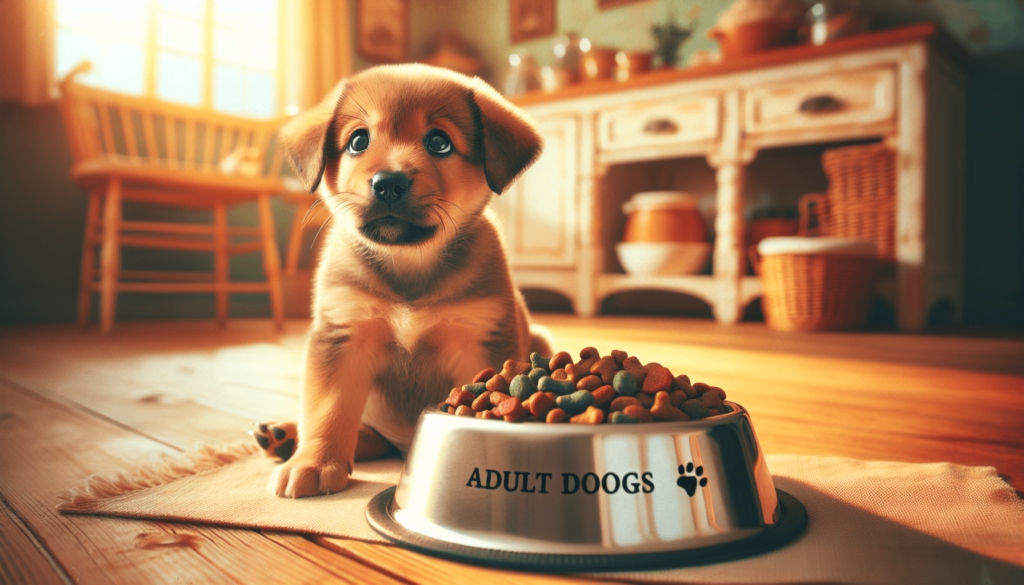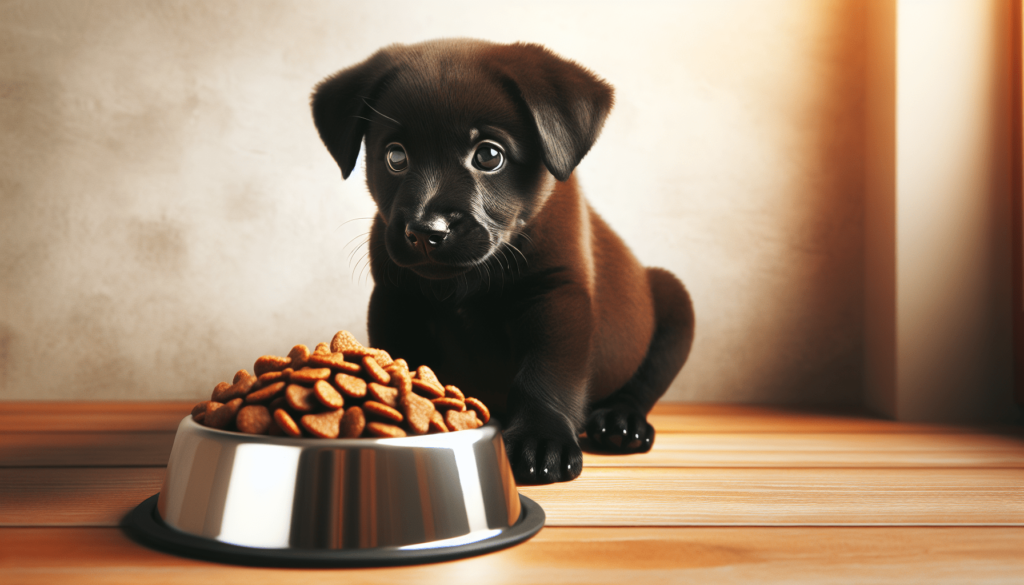Have you ever stared at a bag of adult dog food, pondering whether your bouncy, enthusiastic puppy could have a taste of it? It’s a curious thought I’m sure many of us have had, often prompted by the best of intentions or sometimes simply by convenience. Yet, unraveling whether it’s suitable or even safe for puppies to eat adult dog food requires a deeper dive into the nutritional needs and developmental demands of these young, adorable creatures.

Puppies vs. Adults: Understanding Their Nutritional Needs
Why are Puppies and Adult Dogs Nutritionally Different?
The dietary requirements for puppies differ significantly from those needed by adult dogs, much like children have different nutritional needs than grown-ups. Puppies are rapidly growing and developing, requiring a diet rich in specific nutrients that support their growth, immune function, and overall health. This section delves into the details of why these differences matter and why feeding the correct food is vital.
Key Nutrients Required By Puppies
A puppy’s diet needs to be well-balanced with higher levels of protein, fat, and certain vitamins compared to the diet of adult dogs. Proteins help with muscle development, fats support energy needs, and essential vitamins ensure healthy bones and skin. Let’s delve into why each nutrient is crucial:
- Protein: Benefits muscle development and tissue growth.
- Fat: Provides essential fatty acids and is a concentrated energy source.
- Calcium and Phosphorus: Aid in healthy bone growth and development.
- DHA (Docosahexaenoic Acid): Supports brain development and vision.
These are just a snapshot of what puppies need to flourish into healthy adult dogs.
Can Puppies Eat Adult Dog Food?
Potential Risks of Feeding Puppies Adult Dog Food
While it might seem convenient to scoop adult dog food into your puppy’s bowl, doing so could pose several risks. Adult dog foods typically lack the dense concentrations of protein and fat that growing puppies need. This section explores potential pitfalls like malnutrition, stunted growth, and potential long-term health issues.
Consequences of Inadequate Nutrition in Puppies
Feeding adult dog food can lead to several health issues in puppies, ranging from nutritional deficiencies to growth-related problems. For instance, insufficient protein might cause muscle weakness, while a lack of calcium may affect bone density.
Here’s how different nutrient shortages can impact puppies:
| Nutrient | Possible Deficiency Effects |
|---|---|
| Protein | Muscle weakness, poor coat condition |
| Fat | Lack of energy, dull coat |
| Calcium/Phosphorus | Skeletal abnormalities, dental issues |
| DHA | Cognitive and vision challenges |
Understanding these potential effects highlights the importance of choosing the right food.

Transitioning to Adult Dog Food: When and How
Age to Transition from Puppy to Adult Food
Determining the right age to begin the transition to adult dog food is essential. Typically, this transition happens when a puppy reaches 80% of its expected adult weight. Small breeds may mature faster, transitioning around 9 months, whereas larger breeds may continue growing until they are 12-18 months old.
Gradual Transitioning Tips
Switching from puppy to adult food should be done gradually to avoid digestive upset. The transition generally takes about 7-10 days, slowly incorporating more adult food while reducing puppy food.
Here’s a simple transition plan to guide you:
- Day 1-3: 25% adult dog food and 75% puppy food
- Day 4-6: 50% adult dog food and 50% puppy food
- Day 7-9: 75% adult dog food and 25% puppy food
- Day 10: 100% adult dog food
Such gradual changes allow your puppy’s digestive system to adapt to the new food efficiently.
What if My Puppy Accidentally Ate Adult Dog Food?
Monitoring Your Puppy After an Adult Dog Food Consumption
Don’t panic if your puppy accidentally consumes adult dog food. While it’s not ideal, a one-time occurrence is unlikely to cause serious harm. However, keep a close eye on them for any signs of digestive upset or allergic reactions.
Steps to Take
If your puppy doesn’t show any adverse reactions, it’s generally okay to return to their regular puppy food at the next meal. However, if symptoms like vomiting or diarrhea occur, consult with your veterinarian promptly.
FAQs: Common Questions About Puppies and Adult Dog Food
Can puppies occasionally eat adult dog food?
While not ideal, accidental consumption isn’t typically harmful. However, consistently feeding adult dog food to puppies can lead to nutritional deficiencies.
How long should a puppy be on puppy food?
This varies by breed and size, but generally, puppies should stay on puppy food until they reach about 80% of their expected adult size. This could be as early as 9 months for small breeds and up to 18 months for large breeds.
Can feeding adult dog food affect my puppy’s growth?
Yes, it can. Puppies require specific nutrients to support their growth. Adult dog food might lack these essential nutrients, potentially leading to stunted growth or developmental issues.
Conclusion
To wrap it all up, while it might seem more convenient to feed your puppy adult dog food, it’s not recommended due to the critical nutritional differences required by growing puppies. Ensuring your puppy receives the right nutrients can greatly impact their health and development, ultimately leading to a happier, healthier adult dog. As they transition to adult food, patience and a gradual approach can help ensure a seamless change for your furry friend. Always keep a close eye on their health and consult with a veterinarian for the best dietary guidance tailored to your puppy’s needs.



